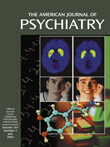To the Editor: In their retrospective study of 38 women, Yvette I. Sheline, M.D., et al.
(1) reported that reduction of hippocampal volume was significantly correlated with lifetime number of untreated days depressed. There was no significant correlation of “hippocampal volume loss” with lifetime number of treated days depressed. Their key conclusion was that “antidepressants may protect against hippocampal volume loss associated with cumulative episodes of depression” (p. 1517). These claims are tenuously based and are subject to serious reservations.
The small, unrepresentative study group and the retrospective design permit no general conclusion about protective antidepressant drug effects on the hippocampus in major depression. There is also no preclinical basis for such speculation. The authors tried to claim such a basis by reference to a preclinical study of the agent tianeptine
(2). They misled readers in stating, “Animal studies have shown antidepressants to protect against stress-induced decrease in neurogenesis with preservation of hippocampal volume during a social stress paradigm” (p. 1518). The cited study of social stress in tree shrews (2) examined no standard antidepressant agents. Tianeptine is not an accepted antidepressant agent. Placebo-controlled trials of its antidepressant efficacy are scarce
(3), and its primary action is opposite to that of the antidepressant drugs that block monoamine membrane transporters. Functionally, tianeptine and fluoxetine have very different acute interactions with stress effects on hippocampal physiology
(4) and opposite effects in behavioral pharmacology testing after long-term administration
(5). In a chronic restraint stress model with rodents
(6), fluoxetine does not possess the protective effect of tianeptine against dendritic atrophy in the hippocampus. In the tree shrew, social stress model, clomipramine has some protective activity similar to tianeptine
(7), but it is a safe bet that none of the patients of Dr. Sheline and colleagues was treated with that drug. The authors lack a coherent preclinical case for their speculation, and what they proffer is misleading.
Questions arise also about the statistical analyses. The first rule of statistical analysis is to inspect the distribution of the data. When that is done, it is immediately obvious from Figure 1 that a group of four outliers with deviant low hippocampal gray matter volumes was responsible for the apparent statistical significance found in the entire group. A straightforward, conservative, nonparametric median split analysis of the data for the remaining 34 subjects reveals no association of hippocampal volume with days of untreated depression (χ2=1.06, df=1, p=0.30, with Yates’s correction). No amount of multivariate statistical modeling will overcome this problem. The authors clearly overinterpreted the data. They are also guilty of a logical fallacy when they speak of “hippocampal volume loss” because only by a prospective design can they measure loss of hippocampal volume.
It is common knowledge that investigators will engage in wishful thinking, even to a point of losing objectivity about their cherished hypotheses. Journal reviewers and editors are responsible for detecting such pathologies of scientific thought. The field is not advanced when a weak clinical data set is overinterpreted, along with a positively misleading preclinical rationale to promote a currently popular theory.

